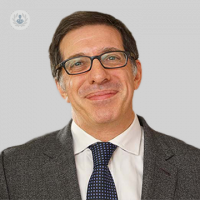Endodontist vs. dentist: what's the difference and the latest in dental technologies?
Written by:When it comes to having a root canal, you have the option of either seeing a dentist or a specialist endodontist. We’ve asked one of our experts, Dr Michael Sultan, to explain the difference between both and how dental technologies have developed over the last 20 years to ensure that you have the best outcome from endodontic treatment, leaving you with the confidence to smile again.

What’s the difference between a dentist and an endodontist?
Endodontists are qualified dentists; however, dentists do a five-year program where they study a mixture of subjects at university whereas an endodontist take their training much higher.
Following their five years at dental school to do dentistry, endodontists will then do post-graduate studies and teaching, and gain a lot more experience in endodontics. There is a specialist pathway in endodontics that takes an additional four or five years.
All dentists should be able to do routine root canal treatments and endodontic procedures but they tend to either not want to because they feel unconfident or that the treatment may be beyond their capabilities. In which case, they will refer patients on for specialist care to an endodontist.
The specialist endodontists usually do endodontics every day of the week and become quite accomplished and are much faster and more efficient at this. In addition, they (usually) have much better equipment and are quite happy to perform all difficult procedures.
What are the cutting-edge technologies used by endodontists?
In the last 15-20 years of endodontics, there have been enormous changes in instrumentation and the equipment that we use, which makes procedures much more efficient and easier to do.
Previously with instruments, we used very rigid stainless-steel files but we've moved on to nickel-titanium instruments. These are super elastic instruments that can work their way around canals very easily and quickly, giving us a much better result.
With radiographs, we used to use wet films that we had to develop and now we’ve moved on to digital radiographs. These contain a much lower dosage of radiation; we can store them easily and really see what we're doing and we can enlarge them.
We use microscopes so that we can really see what we're doing and then we can further use imaging as we've now moved on to CPCTs. This is three-dimensional imaging of teeth so that we can evaluate any problems and see if anything has been missed or overlooked. All of this really helps for better diagnosis and therefore better treatment and a higher success rate.
What is the difference between surgical and non-surgical endodontic treatment?
In the patients who come to us with damaged teeth, infection, inflamed nerves and bacteria residing inside the canals, the best thing we can do is non-surgical treatment. This is where we access the teeth and go into the canals to clean, prepare, enlarge and ultimately seal them. If the tissue is damaged and inflamed then all of that is removed. If there's infected tissue, the canals are disinfected and sealed.
Sometimes patients come to us and treatment has already been done once but hasn't gone so well. The primary option is to take out the initial root filling and redo it. Sometimes, however, it's not possible to access these canals in cases where a crown was present and maybe a post cemented into the roots.
In these cases, we would opt for surgery. This involves lifting up the gum and taking bone away and moving damaged tissue around the tip of the tooth and sealing the apex.
We only do this if the root canal treatment has failed or we can't access the canals. Also, in some cases, patients have had very new, expensive restorative care done and don't want any potential damage to it.
Doing root canal treatment may involve removing the crown and having to retreat the tooth. Sometimes the expenses of redoing a treatment, compared to doing apical surgery where we leave the crown as it is and do surgery at the apex, is often a cheaper option.
Book an appointment with Dr Sultan via his Top Doctor’s profile if you need a root canal done by a highly-experienced specialist.


